Ugly Beauty (16 page)
Authors: Ruth Brandon

Eugène Schueller giving a lecture, Paris, 1941.
Archive, Mémorial de la Shoah,
Paris
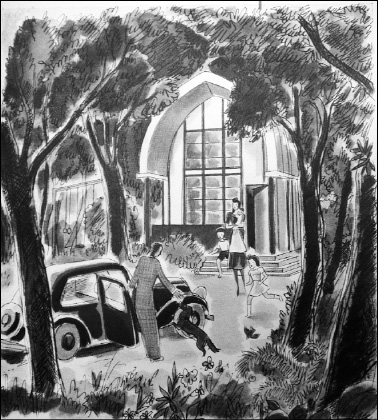
Schueller’s design for an ideal home, gothically
arched for maximum light, and complete with an ideal family, including a dog, a
car, and three children. Note that it is the wife who holds the baby. From
Le Deuxième salaire
, popular illustrated edition,
1940.
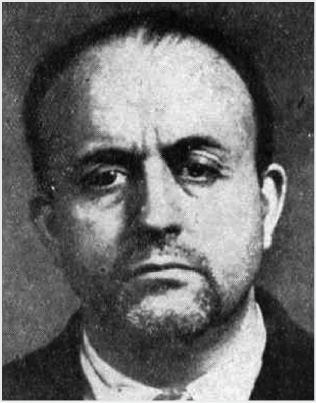
Eugène Deloncle, founder of La Cagoule and
Schueller’s colleague in the Mouvement Sociale Révolutionnaire, 1940.
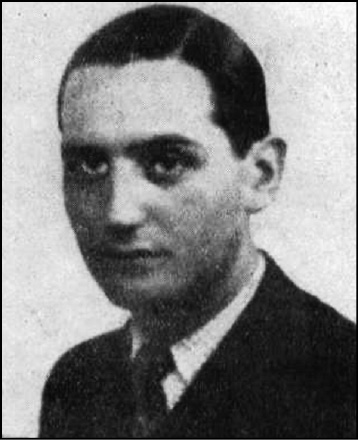
Jacques Corrèze aged thirty-three, at the time of
the Cagoule trial, 1945.
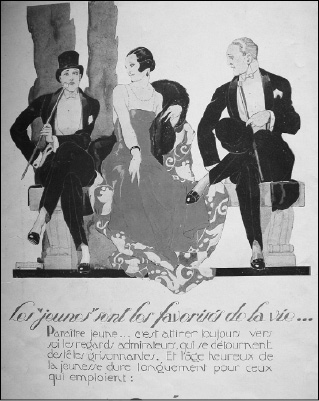
“The young are life’s favorites. . . . And youth
lasts longer for those who use L’Oréal.”
L’Oréal ad, 1923
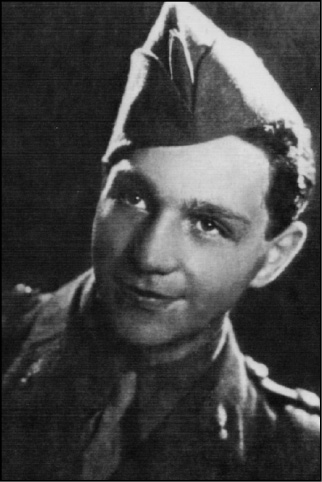
Jean Frydman in 1944, at the time of the
Liberation.
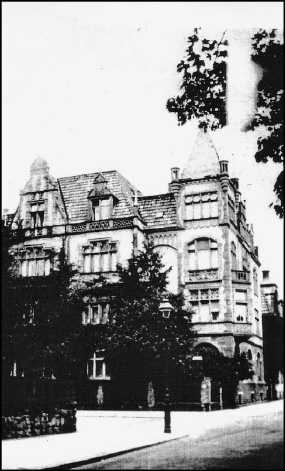
The stolen Rosenfelder house in Karlsruhe.
Courtesy Monica
Waitzfelder
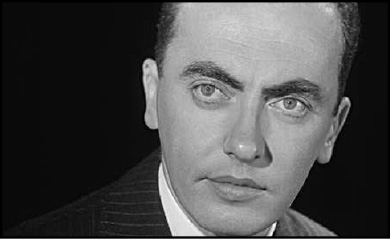
André Bettencourt in 1973 when he was acting
Minister for Foreign Affairs.
Official photo, Archives
Diplomatiques
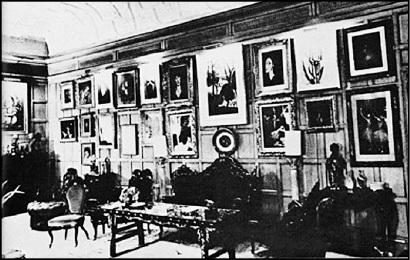
Helena Rubinstein’s New York drawing room, 1950s.
“Quality is nice, but quantity makes a show.”
Photo: Helena Rubinstein
Foundation
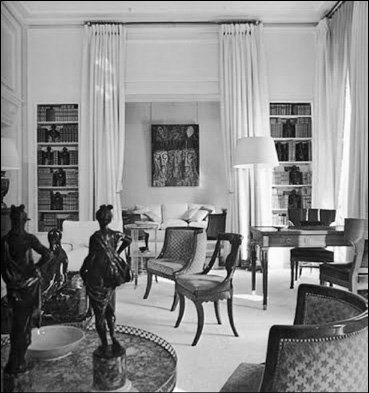
Liliane Bettencourt’s salon in her Neuilly mansion,
a model of tastefulness.
Photo:
Architectural Digest/
Condé
Nast
Family Affairs
I
The sons and grandsons of an industry’s creators
won’t take risks. Sons should inherit money, but not management. If a son wants
to work, he should take a job elsewhere and work his way up.
—E
UGÈNE
S
CHUELLER
,
La
Révolution de l’économie
A
mong the
most strongly held of Eugène Schueller’s many strongly held beliefs was the
conviction that businesses (as opposed to money) should not be passed on as a
family inheritance. When Helena Rubinstein’s first grandchildren were born, she
declared, “Now the business will last for three hundred years!”
1
But such a thought would have been anathema to
Schueller. On the contrary, he thought entrepreneurship required very particular
skills, and that “being a general’s son doesn’t automatically make you a good
general.” (This was a pet expression of Schueller’s, and he used these same
words in article after article, lecture after lecture.)
Of course, it was easy for him to say this. His
only child was a daughter, which (given his view of woman’s place in the world)
ruled her out as a possible candidate. And since he had no siblings, he had no
aspiring nephews. But it also left him with a problem. Building up L’Oréal had
been his life’s work. It would have been less than human, not to say
irresponsible, to give no thought to his eventual successor. Schueller, of all
people, knew that his day-to-day decisions affected the lives of hundreds,
possibly thousands, of people. Since he was not immortal, perhaps the most
important decision of all concerned the man who would take his place when he
died or retired. But who would that be? And how would Schueller identify him? As
the thirties drew on and he moved into his middle fifties, he began, consciously
or subconsciously, to look around for the young man who would become, in effect,
his surrogate son.
As it turned out there would be two such people,
each playing a different filial role.
The first, André Bettencourt, was introduced to
Schueller in 1938 by a journalist friend, who invited Bettencourt to lunch with
“a man you really ought to meet, he’s extraordinary.”
2
Bettencourt was then nineteen, Schueller fifty-seven. The meeting
took place in Schueller’s boulevard Suchet apartment, where Bettencourt also met
Schueller’s daughter, Liliane. The friendship flourished. In December 1941,
Bettencourt referred in an article to “a remarkable book by a friend, M. E.
Schueller, called ‘La Révolution de l’Economie’ . . . that all
businessmen ought to read.”
3
In that same year, 1941, Bettencourt drew
Schueller’s attention to another promising young man: his friend François Dalle.
The two had met as students in 1936, when both lived at a university residence
for young men such as themselves—Catholic, provincial, well-connected—run by the
Marist Fathers at 104, rue de Vaugirard. In 1941, Dalle needed a job, and
Bettencourt thought Schueller might have one for him.
Although Bettencourt and Dalle were both members of
the Catholic bourgeoisie, they had grown up in very disparate milieux. The
Bettencourts were traditional Normandy landowners, conservative and rooted in
their village, St. Maurice d’Ételan, of which André’s father was the mayor, of
which he would in time become mayor himself, and where they were intricately
intermarried with the surrounding seigneurial families. They were pious, and M.
Bettencourt
père
went on frequent religious
retreats, although meditation did not prevent him writing home to remind his
gardeners, when planting new apple trees, to “if possible put some fresh soil in
the holes.”
4
These two preoccupations—religious
and agricultural—were passed on to André, and were reflected in his wartime
activities.
By contrast, the Dalles were industrialists from
France’s gritty Nord. François’s father was a brewer in Wervicq-Sud, near the
Belgian border. The family lived beside the brewery, and their neighbors were
mostly working families. François grew up in an austere and socially conscious
household, aware from his earliest youth of industrial conflict and the ravages
of war. He realized, too, that the main source of unrest in the local textile
industry—the workers’ continuing and justified complaints about their low level
of pay, the factory owners’ riposte that as their profits were so low, they
could not afford to pay more—arose because of outdated attitudes and machinery.
Capitalism, he concluded, could be justified only insofar as it brought material
abundance.
5
By the time the two young men arrived in Paris,
toward the end of 1936, it was clear that Europe was sliding toward another
general conflict, and that France, if involved, would almost certainly be
defeated. In 1937 and again in 1938, Dalle, Bettencourt, and some other friends
from the old university lodgings at 104, rue de Vaugirard, including France’s
future president François Mitterrand, whose family was in the vinegar business
in the Charente, visited Luxembourg, Belgium, and Germany during their
vacations. They saw tanks rolling at full speed through villages while the
villagers cheered and girls threw flowers. On one memorable day, on a riverbank
near the German-Luxembourg border, they watched as a thousand soldiers in
swimming-gear stood at attention while a hundred-piece orchestra played
Beethoven, and then, at the sound of a bugle, threw themselves, as one man, into
the river. It was an impressive show of fitness and discipline, and the young
Frenchmen were left wondering how their ragtag conscript army could ever stand
up to a force composed of men such as that.
6
In this charged and uncertain atmosphere, the young
men from 104 inclined to the right. The left seemed to offer only chaos.
Fascism—not as practiced by Hitler, but of the Mussolini and Salazar Catholic
variety—at least held out the possibility of order. “We didn’t think Mussolini
would go in with Hitler,” Dalle said. “We were bourgeois students, Catholics.
. . . We knew the war was lost before it began, because our arms were
as hopeless as our high command. We were just cannon fodder.
. . .”
7
They were mostly studying
law, and preferred to use the faculty library, which was recognized as the
province of the far-right Camelots du Roi, rather than the Sorbonne library,
where, Dalle said, “less than 5 percent were non-Marxists, and not a single girl
ever caught your eye.”
8
When the war came, Dalle, Mitterrand, and
Bettencourt, like all young Frenchmen, were called up. Following the debacle of
France’s capitulation, Mitterrand was captured and sent to a prisoner-of-war
camp inside Germany, an experience that would shape his future political career,
while Bettencourt and Dalle returned to Paris, and looked around for something
to do. Bettencourt found a job in journalism, writing a youth-interest column
under the heading
Ohé les jeunes!
for a magazine
called
La Terre Française
, directed at
agriculturists. Dalle thought of resuming his studies. But his preferred
professors were no longer teaching their courses, and besides, having just
married, he needed to earn some money. Going through the want ads one day he
noticed that the Society of French Soapmakers, working through Monsavon, was
looking for trainees. He knew that Schueller owned Monsavon, and knew and liked
his economic theories. He knew, too, that his friend André was acquainted with
the Schuellers. Bettencourt encouraged him to apply for the job.
Schueller, who always took a personal interest in
trainees, met Dalle, agreed to hire him, and asked where he came from. The Nord,
Dalle replied. “That’s good,” Schueller said. “In this country there are only
two sets of people who really work, the ones from Alsace, and the ones from the
Nord.” A few days later, Dalle presented himself for work at the Monsavon
factory in Clichy, a dank place in what he described as “the miserabilist style
of the Paris suburbs.” He was twenty-four. His job was to help the sales
director’s secretary—“a radical change of direction,” as he observed, “for
someone who had always dreamed of teaching law.”
9
His first job, which he hated, consisted of
multiplying the number of soaps sold by their price, to calculate turnover. But
at the end of 1943 the sales director fell ill, and the managing director
mysteriously vanished: suddenly, at the age of twenty-five, Dalle found himself
the de facto boss of a large factory. Schueller liked to divide his colleagues
into two categories: people men and things men. Dalle certainly wasn’t a “things
man,” though there were two in the factory: they had just devised an innovative
continuous soap-making process that would prove valuable in the immediate
postwar years. However, they couldn’t try it out on Monsavon’s wartime product,
which consisted almost wholly of bentonite and kaolin and contained virtually no
fat. It could hardly be called soap at all. And there were problems with morale.
Keeping Monsavon’s little community going in those desperate days, when food of
any kind was short, good food almost unobtainable, and nobody trusted anyone
else, was an invaluable experience for the “people man” François Dalle would
become.
Monsavon survived the war. But it then faced the
problem of surviving the peace, which had its own difficulties. In wartime the
buying public had grabbed anything put before it, including Monsavon’s ersatz
soap; but now the presence of American troops and American products reminded
battered Europeans of a long-forgotten abundance. American competition meant
hard times for indigenous companies facing huge shortages of raw materials.
Dalle thought for a while about returning to the law, but he had lost the habit
of study, and soon realized that the subject no longer interested him. So he
returned joyfully to Monsavon and the entrepreneurial life he found so
exhilarating, and was put in charge.
During these years, Schueller let Dalle get on with
the job without interference. One summer Sunday in 1948, however, an indication
came that Schueller had plans for him. Summoned to the Franconville house, Dalle
was informed that, starting the next day, he was to work at L’Oréal as well as
Monsavon. He had done well with Monsavon and, hopefully, would continue to do
so. But now it was time to find his place within the company as a whole. “I was
flattered, but terribly embarrassed,” Dalle remembered. “It hadn’t ever crossed
my mind that women’s hair grew white as they got older, let alone that they
might dye it—the notion that one might want to change the natural order of
things would have seemed odd to me, actually almost shocking. Where I came from
women didn’t use cosmetics.”
10
This uncertainty was soon buried, however, beneath
the whirlwind of his new life. He was given an office at rue Royale and began
the long task of getting to know a new business and gaining the trust of
longstanding lieutenants over whose heads he was all too evidently being
promoted. He soon became Schueller’s chief confidant, which meant adopting his
chief’s frenetic pace. From six till eight a.m. he read notes dictated by
Schueller the previous evening, then walked for an hour around the park at
Bagatelle, near where he lived, before dictating his responses. He spent the
morning at Monsavon and the afternoon at L’Oréal, staying there until nine—the
hour when Schueller left the office.
After a few months of this pace he became tired,
and Schueller offered him and his family the L’Arcouest house for a couple of
weeks of relaxation and enjoyment. It rained solidly; when the offer was renewed
the following year, Dalle’s wife and children refused to accompany him. It
rained again; cooped up all alone in the big house, Dalle thought longingly of
Paris and all the work awaiting his return. He called for his secretary and
resumed his Parisian work schedule, wondering later if this had not been a
deliberate ploy on the part of Schueller, who did the same thing during
his
vacations.
It was soon clear to them both that Dalle would be
L’Oréal’s next chief executive. But it was not until 1957, when Schueller’s
health began to fail, that this was said in so many words. That July, Dalle was
summoned to L’Arcouest. He found Schueller tanned and apparently well, but
appearances were deceptive: he was dying. He was L’Oréal’s present, the old man
said, but Dalle would be its future. The speech left both of them in tears. Not
long after it, Schueller died, and Dalle became managing director of
L’Oréal.
Where, politically and
commercially, Schueller had remained essentially a man of the 1930s, Dalle would
move L’Oréal into the postwar world.
11
W
hile
Dalle was taking his place as Schueller’s industrial heir, André Bettencourt had
maintained their friendship on a more personal level: in 1950, he would marry
Schueller’s daughter, Liliane. The file of papers concerning Schueller’s
épuration
trial contains two letters from Bettencourt,
one written in January 1944, the other in September of the same year. They make
it clear that the two had become close enough for Schueller to trust the younger
man with both money and personal confidences.
By 1944, the course of the war had turned in the
Allies’ favor, and those who had positioned themselves three years earlier in
expectation of a German victory now found themselves somewhat awkwardly placed.
Bettencourt had spent the first years of the war as a journalist, writing for
collaborationist and Pétainist publications, and had later spent some time at
Vichy, working for the Pétain administration there. It is clear from his January
letter to Schueller that both of them anticipated difficulties if, as seemed
increasingly likely, the Germans were defeated.
